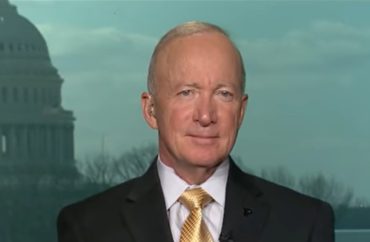
Purdue President Mitch Daniels’ annual message to the university community included a not-so-politically correct message: it’s a good thing there are more men than women at the Indiana school.
The Big Ten university bucked the trend of declining male enrollment, a source of pride for the former Indiana governor.
“Our historic average of about 57% men in the undergraduate population has held remarkably steady, even as many other schools saw that share drop to the low 40’s or even lower,” Daniels said. “There is no intention behind this against the trend position, and no mystery about the reasons. Young men and women select into various disciplines at very different rates, and the STEM subjects which are relatively predominant at Purdue tend to attract men.”
He made the statement in the context of reports about a gender enrollment gap. Daniels also made a remark about most nursing and veterinarian students being females, yet no one was upset about that fact.
Daniels also noted that the enrollment gap trend between men and women is likely contributing to the lower birth rates, as female college graduates do not want to marry and have children with men without college degrees.
“The simple mathematics of more women than men earning college degrees means that many highly educated women will either have to partner with less-educated men, or forgo partnership,” the New York Times said. Daniels highlighted that analysis in his annual address.
Feminists were predictably in an uproar.
“You say that no one is writing you about the lack of men in vet med or nursing,” Purdue graduate Sarah Reaves wrote on Instagram, according to The Exponent. “[B]ut what your patriarchal framework fails to see is that the same misogyny that is keeping men from wanting to join programs is also keeping women out of engineering, computer science and technology.”
“It seems like some kind of chutzpah to take a perennial challenge of Purdue’s, that people across campus are trying to fix — our comparatively low numbers of women in engineering even compared to our peers — and instead just spin it as an asset,” Professor Alice Pawley said. She teaches engineering at Purdue.
Women want to and should be at home
At the center of this controversy is of course the role of men and women in society, which contributes to present problems with marriage, childbearing and the raising of children.
Women should be the primary caregivers of children and men should be the primary breadwinners. That’s not just my Roman Catholic view on the responsibilities between the two sexes – that’s what women generally say too.
“About half of employed parents with children younger than 18 – including similar shares of mothers (53%) and fathers (51%) – say being a working parent makes it harder for them to be a good parent,” a 2019 Pew poll reported.
Though the poll reported that most women working said “it would be best for them personally to be employed” most respondents said working full-time is not “ideal” for women.
Pew reported:
When asked more generally about the ideal situation for men and women with young children – rather than about what works best for them personally – about three-quarters of U.S. adults (76%) say working full time is ideal for fathers, while just 33% think this is the ideal situation for mothers. About four-in-ten (42%) say working part time is ideal for women with young children, while 21% say not working for pay at all is ideal for this group.
“About a third of women (33%) and men (32%) say working full time is ideal for mothers; 44% of women say working part time is ideal (vs. 40% of men), while 19% (vs. 23% of men) say not working for pay at all is ideal,” the poll said.
Jordan Peterson has weighed in on the “maternal expression” he has observed from his research and work with law firms.
“What’s happening with all those maternal instincts, they’re just gone all of a sudden,” Peterson said. “I mean many 19-year-old girls I’ve talked to many of them believe that their career is going to be the most important thing in their life.
“Very few 30 year old women believe that even if they have high-powered careers because they tend to discover that high-powered careers come at a substantial cost like 60-70 hour work weeks,” he said.
He said law firms struggle to retain female talent, despite offering lucrative financial benefits, because women ultimately want to focus on raising children first, not working long hours at a prestigious job.
MORE: Abortion leads to a poverty of the soul
IMAGE: MSNBC/YouTube
Like The College Fix on Facebook / Follow us on Twitter







Please join the conversation about our stories on Facebook, Twitter, Instagram, Reddit, MeWe, Rumble, Gab, Minds and Gettr.